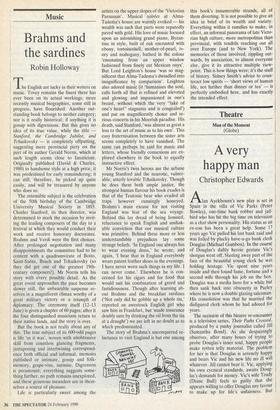Music
Brahms and the sardines
Robin Holloway
he English are lucky in their writers on music. Tovey remains the finest'there has ever been on its actual workings; more recently musical biographies, some still in progress, have flourished. Another out- standing book belongs to neither category; nor is it really historical; if anything it is gossip with digressions. But this gives no idea of its true value, while the title — Stanford, the Cambridge Jubilee, and Tchaikovsky — is completely offputting, suggesting mere provincial piety on the part of its author Gerald Norris, which at such length seems close to fanaticism. Originally published (David & Charles, 1980) in handsome style at a high price, it was predestined for early remaindering; it can still, therefore, be picked up quite easily, and will be treasured by anyone who does so.
The ostensible subject is the celebration of the 50th birthday of the Cambridge University Musical Society in 1893. Charles Stanford, its then director, was determined to mark the occasion by invit- ing the leading composers of the day to a festival at which they would conduct their work and receive honorary doctorates. Brahms and Verdi were the first choices. After prolonged negotiation and many disappointments the committee had to be content with a quadrumvirate of Boito, Saint-Saens, Bruch and Tchaikovsky (so they did get one of the greatest 19th- century composers!). Mr Norris tells his story with every possible detail. As the great event approaches the pace becomes slower still, the unbearable suspense re- solves in a magnificent climax worthy of a great military victory or a triumph of diplomacy. The ceremony itself (12-13 June) is given a chapter of 60 pages; after it the four distinguished musicians return to their native lands, and the story is over.
But the book is not really about any of this. The true subject of its 600-odd pages is life 'as it was', woven with unobtrusive skill from countless glancing fragments, juxtaposing and intertwining correspond- ence both official and informal, memoirs published or intimate, gossip and folk- memory, grape-vine, surmise. Digression is paramount; everything suggests some- thing further, no path remains unexplored, and these generous meanders are in them- selves a source of pleasure.
Life is particularly sweet among the
artists on the upper slopes of the 'Victorian Parnassus'. Musical soirees at Alma- Tadema's house are warmly evoked — his wealth was such that parts were reputedly paved with gold. His love of music focused upon an astonishing grand piano, Byzan- tine in style, built of oak encrusted with ebony, tortoiseshell, mother-of-pearl, iv- ory and mahogany, bathed in the colour 'emanating from an upper window fashioned from finely cut Mexican onyx'. But Lord Leighton's house 'was so mag- nificent that Alma-Tadema's dwindled into insignificance by comparison'. Leighton also adored music (it 'humanises the soul, calls forth all that is refined and elevated and glowing and impassioned in one's breast, without which the very "lake of one's heart" stagnates and is congealed') and put on magnificently choice and se- rious concerts in his Moorish paradise. His death, said Stanford, 'was almost as great a loss to the art of music as to his own'. This easy fraternisation between the sister arts seems completely to have vanished. The same can perhaps be said for music and letters, whose friendly connexions are ex- plored elsewhere in the book to equally instructive effect.
Mr Norris's twin heroes are the urbane young Stanford and the neurotic, vulner- able, utterly lovable Tchaikovsky. Though he does them both ample justice, the strongest human flavour his book exudes is that of the Teutonic bear who evaded all traps however cunningly honeyed. Brahms's main excuse for not visiting England was fear of the sea voyage. Behind this lay dread of being lionised, reluctance to speak English and unshak- able conviction that our musical culture was primitive. Behind these more or less understandable prejudices lay some strange beliefs. 'In England one always has to wear evening dress,' he wrote; and again, 'I hear that in England everybody wears patent leather shoes in the evenings. I have never worn such things in my life. I can never come.' Elsewhere he is con- cerned for his cigars and for food that would suit his combination of greed and fastidiousness. Though after learning ab- out Brahms and the breakfast sardines (Not only did he gobble up a Whole tin,' reported an awestruck English girl who saw him in Frankfurt, but 'made assurance doubly sure by drinking the oil from the tin at a draught') we are left in no doubt as to which predominated.
The story of Brahms's unconquered re- luctance to visit England is but one among
this book's innumerable strands, all of them diverting. It is not possible to give an idea in brief of its wealth and variety. Everything within it ramifies to make, in effect, an informal panorama of late Victo- rian high culture, more metropolitan than provincial, with tendrils reaching out all over Europe (and to New York). The memories of those involved, rippling out- wards, by association, to almost everyone else, give it its attractive multiple view- point. This is how things were; it's the stuff of history. Sidney Smith's advice to coun- teract low spirits — 'short views of human life, not further than dinner or tea' — is perfectly embodied here, and has exactly the intended effect.


















































 Previous page
Previous page